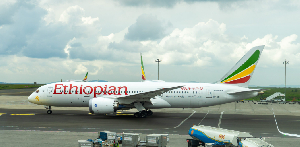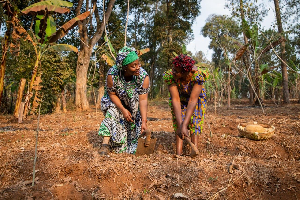The Peasant Farmers Association of Ghana (PFAG) and Small Scale Women and Men Farmers in Ghana, have appealed to government not to cancel fertilizer subsidy since the move would be disastrous to members and collapse the agriculture sector.
The two bodies said withdrawal of fertilizer subsidy would also worsen the economic conditions of the country since more money would be spent on the importation of food.
The Peasant Farmers Association of Ghana are appealing to government to approach this issues pragmatically with all the urgency it deserves and make subsidised fertilizer available at affordable prices as early as possible, and also provide additional incentives to small scale farmers that will enable them live a comfortable life to continue to supply the country with the needed food supply.
A statement co-signed by Mr. Nashiru Mohammed, President PFAG and Mr. Godwin Atokple, Vice President PFAG and copied to Ghana News Agency on Tuesday said information reaching the Association from members throughout the country indicated that there had been almost 100 per cent increase in fertilizer prices since the season started in April, which is making it difficult for Small Scale Farmers to purchase.
It said members of PFAG were alarmed with government’s silence on releasing subsidised fertilizer for 2014/2015 farming season even though the Minister of Food and Agriculture had promised that the subsidy would continue.
The statement said the fertilizer subsidy programme established since 2008 aimed at helping farmers increase their rate of fertilizer application as a means of increasing crop productivity and also to increase the country’s fertilizer application rate to at least 50 kilogrammes (kg) per hectare (ha).
It said it became necessary after statistics showed that Ghana’s fertilizer application rate was one of the lowest in the world, standing at 8kg/ha compared with 20kg/ha in sub-Sahara Africa, 99kg/ha in Latin America, 109kg/ha in South Asia, and 149kg/ha in East and South East Asia.
It said the low application rate of fertilizer in the country was attributed to amongst other things such as: “The high level of poverty among Small Scale Farmers, low profit margin and high cost of fertilizers.
“Even after government subsidy which reduced the price to 50 per cent Small Scale Farmers especially women were still finding it difficult to purchase,” the statement said.
“Today 50kg of NPK is selling at Ghc95.00 while Urea also goes for Ghc95.00 with Sulphate of Ammonia also being sold at Ghc85.00.
“A farmer needs a minimum of about two bags of NPK and one bag of Urea for one acre of maize while for rice. We need two bags of NPK, one bag of Urea and one bag of Sulphate of Ammonia for one acre all depending on the location for ploughing one acre go for Ghc100.00," the statement noted.
The statement outlined the importance of agriculture as providing employment to about 50.6 per cent that is 4.2 million people of the labour force in the country and still had the potential of addressing the problem of unemployment, stabilising the cedi and put the economy in good footing if conscious efforts are made to tackle the bottlenecks in the sector and link it up to industry.
“We the Small Scale Farmers who are the backbone of agriculture in the country are doing our part to make Ghana food secured and wish to appeal to the Government and the President to show similar passion as demonstrated in the world cup by urgently devoting $20 million and additional $100, 000.00, to motivate players to replicate the same in the agriculture sector," it said.
It reminded government on riots in Haiti, Bangladesh, Tunisia and Egypt over the soaring costs of basic foods saying: “We can play politics with everything but not with people’s stomach as the agriculture sector played a key role to overall economic growth and development of Ghana," it added.
PFAG also called on the government to help solve the challenges in the agriculture sector which included extension service, mechanisation service, feeder roads networks, irrigation facilities and climate change which were more important and impact on the Ghanaian agriculture system.
Business News of Wednesday, 2 July 2014
Source: GNA












